This is where the real deals at Davos are done
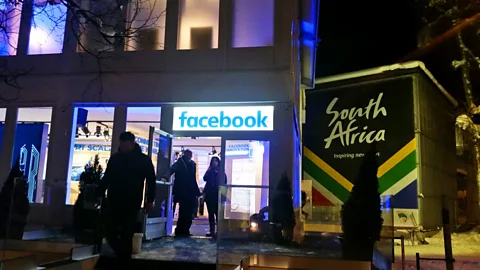 Lucy Marcus
Lucy MarcusForget the official events and parties. BBC Capital’s guide to the Davos fringe, where the powerbrokers meet — by invitation.
Case Study
How one company took over a storefront…
Infosys, a technology consulting firm, has held a well-attended official evening reception for many years at Davos. This year, its new chief executive, Vishal Sikka, decided to go bigger, in part to “better tell the story of a new Infosys,” the company said. To do so it hired a private space on Davos’ main street, taking over Escher Raumdesign, a designer furniture shop.
Five days ahead the shop was cleared and the space transformed into a hub with meeting space, a technology showcase and events venue. Luminaries scheduled to attend or speak include leading professors from universities like Carnegie Mellon and University of California at Berkeley. The company will also hold a cocktail reception for 250 guests and brew fresh coffee all day and night for people who stop in.
Goals include marketing the company’s vision of “creating a better future for humanity through technology and education” through something tangible for WEF attendees.
What if you gathered some of the world’s most powerful people for four days of serious discussion — and your star attendees were distracted from the main event? Welcome to Davos.
Call it the Davos Fringe Festival. Increasingly this "fringe", the privately-organised events, are taking the attention of attendees away from the Congress Centre and the WEF’s carefully curated programme. Invitations to private gatherings start to trickle in beginning in November — and by the weeks before the gathering, it’s an avalanche.
And, arguably it is at the periphery that a lot of the real business gets done. Behind closed doors there are many private functions organised by companies, academic institutions, non-profits and special interest groups.
Controlled and elite
For those fringe organisers — typically banks, technology companies, consulting firms and even fitness companies — Davos is the perfect place to reach a powerful group they might not otherwise be able to gather together. Control over content and the guest list is a significant appeal for companies with deep pockets. They can focus on niche or specialised topics that might not make the cut for the official programme.
One example: Lesbian Gay Bi-Sexual and Transgender community issues have finally made it onto the official agenda, but LGBT discrimination issues have been discussed for several years at such private gatherings and privately organised panels.
And for attendees, these out-of-officialdom events are a draw because they combine topics they’re interested in with people they want to see and talk to, usually in a smaller venue than many of the official events. What’s more, the conversation flows more freely because most of these gatherings are off the record.
For instance, I spoke last year at an event hosted by a large investment bank that brought together board members from multinational companies, plus institutional and hedge fund investors. Davos was the ideal place to have it, as it’s not easy to gather all of the people who were in the room at any one time. Challenging conversations can sometimes work better over a nice meal in a comfortable setting when people are primed to be open to new ideas, as they are in Davos.
It was a fairly exclusive gathering of around 20 people and there was discussion around topics that still seem to be hard for the WEF to put on the main programme — namely boardroom reform, business ethics, and the prevailing winds of distrust from the public towards big business. The conversation was strictly off the record, which led to open, and sometimes fairly feisty, talk.
Going all out
Events are held in hotels, and increasingly, converted clothing shops, cafes, and even a bowling alley or in private chalets.
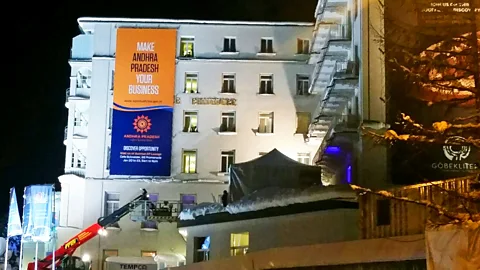 Lucy Marcus
Lucy MarcusBrand names plastered on every surface that can be covered — this year more than ever before. Accenture, Aberdeen, Infosys, Microsoft, Facebook. The streets are no longer dotted with local shops. Companies take the shops over for the entire week and completely overhaul them to the point where you have no idea what that space is during the rest of the year (at costs that can run into the tens of thousands of dollars or more) in an effort to increase visibility, have an on-site headquarters or for private events and client meetings.
Hotels are covered in multiple corporate banners, all in competition for the eyeballs of not just the 2,500 official attendees, but also for those who don’t have a participant badge — staffers, executives and many others.
Companies target parts of town you can only go to if you have a badge of some kind, be it as a delegate or simply a hotel badge. Among them: corporate marketing and support teams, executives taking the opportunity to meet clients or prospects at a place where everyone is gathered to listen and think big.
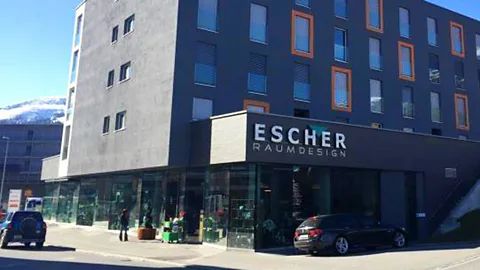 Infosys
InfosysSome fringe events gather upwards of a hundred people together in a small museum or large cafe. Others entice people to small panels over breakfast. Still others are even more exclusive — small suppers of 10 or 15 people.
Toeing the official line
The private events can cause a bit of a headache for the organisers of the real conference. In addition to taking attention away from the main agenda and a little lost cachet for the Congress Centre, where the WEF hopes people will congregate and chat. Still, many of the WEF’s strategic partners at Davos are also hosts of unofficial private events and storefront takeovers.
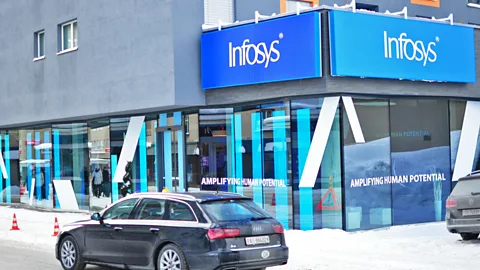 Infosys
InfosysThe WEF provides guidelines, stating in their official Charter of Participation for the World Economic Forum Annual Meeting sent to all registered participants that “no private events will be in conflict with the official programme”, which essentially limits private events to mealtimes and evenings, but judging from my inbox, that has simply led to more discretion about smaller and more exclusive off the record events throughout the day that are kept below the radar.
Organisations are also getting around a WEF requirement that only registered annual meeting attendees or those with a special hotel badge attend private events by holding events in the private spaces that they have taken over and renovated for the week of Davos.
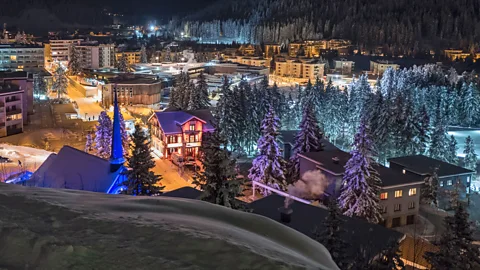 Getty Images
Getty ImagesFor those venturing from fringe event to fringe event, the choice is often guided by proximity and inertia. Once you’ve made it through the crush of security and changed out of your snow boots and checked your coat and extra bags, it makes it harder to be tempted out into the -16 degree centigrade night again.
That’s why many companies still book their events into hotels like the Steigenberger Grandhotel Belvédère, which is centrally located holds multiple events at a time. People can go from cocktails to dinner to nightcap all in the one hotel. Still, the companies that have invested in renovating their own space, hope attendees will be tempted out to star-studded gatherings with Nobel Prize winning economists, scientists, high profile politicians and excellent food.
With so many events scheduled one on top of another, with world class speakers and, in some cases, Michelin-starred chefs, choosing what to attend is not so easy.
Though I’m tempted this year to apply the Konmari method — picking only those gatherings that spark joy — it isn't that simple. Selecting what to attend is a careful balance of pragmatic judgement of where I can get the most done in the shortest period of time, and ensuring I fulfil commitments to meet with the people I need to see.
To follow BBC Capital’s Davos coverage or to comment on this story or anything else you have seen on BBC Capital, please head over to our Facebook page or message us on Twitter.
Lucy Marcus is an award-winning writer, board chair and non-executive director of several organisations. She is also the CEO of Marcus Venture Consulting. Follow her Davos coverage for BBC Capital here and on Twitter @LucyMarcus.
